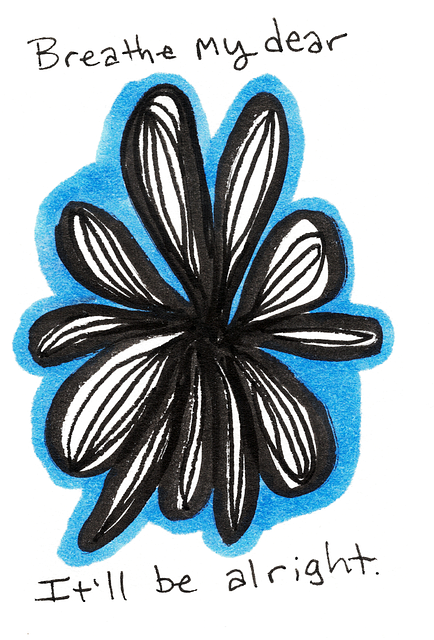Healthcare provider burnout, driven by workload, long hours, and emotional demands, negatively impacts well-being, patient care, and organizational productivity. Early recognition and strategies like those offered by Parker Stress Management Therapy (PSMT) are crucial. PSMT combines mindfulness meditation and mental wellness coaching to improve resilience, emotional regulation, and present-moment awareness, leading to better coping mechanisms, communication skills, job satisfaction, and overall well-being within healthcare organizations. A supportive work environment, including access to mental health services, emotional healing processes, open communication, recognition of contributions, and depression prevention programs, is key to preventing burnout and enhancing patient care. Self-care practices like exercise, meditation, adequate sleep, hobbies, socializing, peer support, structured routines, and achieving a healthy work-life balance are essential in building resilience against stress and burnout.
Healthcare provider burnout is a growing concern, impacting not just individuals but the entire healthcare system. This article explores comprehensive strategies to prevent burnout among healthcare professionals. We delve into the causes and consequences, introducing innovative solutions like Parker Stress Management Therapy. Additionally, we provide organizational strategies for supportive work environments, self-care practices, and long-term resilience building. By implementing these measures, healthcare organizations can foster a culture that prioritizes well-being and mitigates burnout risks.
- Understanding Burnout Among Healthcare Providers: Causes and Impact
- Parker Stress Management Therapy: An Innovative Approach to Burnout Prevention
- Creating a Supportive Work Environment: Strategies for Organizations
- Self-Care Practices for Healthcare Professionals: Prioritizing Well-being
- Building Resilience and Work-Life Balance: Long-term Solutions
Understanding Burnout Among Healthcare Providers: Causes and Impact

Healthcare provider burnout is a growing concern within the industry, impacting not only individual well-being but also patient care and organizational productivity. Burnout occurs when healthcare professionals experience prolonged stress and emotional exhaustion, often leading to decreased job satisfaction and performance. Various factors contribute to this phenomenon, with high workload, long hours, and intense emotional demands being significant triggers. The impact is far-reaching; it can lead to increased errors, reduced patient outcomes, and even physical health issues for healthcare providers.
Understanding burnout at its core involves recognizing the interplay of work-related stress and personal resilience. Recognizing the signs early on is crucial, as it allows for the implementation of effective strategies such as those offered by Parker Stress Management Therapy. By focusing on trauma support services and burnout prevention, healthcare organizations can foster a culture that prioritizes communication strategies to enhance emotional well-being. This, in turn, can lead to improved job satisfaction, increased productivity, and better patient care.
Parker Stress Management Therapy: An Innovative Approach to Burnout Prevention

In recent years, healthcare provider burnout has become a pressing issue, leading many to seek innovative solutions for prevention. One such approach gaining traction is Parker Stress Management Therapy (PSMT). PSMT offers a unique blend of techniques designed to help medical professionals manage stress and enhance their resilience. At its core, this therapy emphasizes mindfulness meditation as a tool to cultivate present-moment awareness and promote emotional regulation. By integrating mindfulness into daily routines, healthcare providers can develop a deeper sense of calm and clarity, reducing the impact of workplace stressors.
Beyond mindfulness, PSMT incorporates confidence-boosting strategies tailored to the challenges faced by medical professionals. Through mental wellness coaching programs, healthcare workers learn effective coping mechanisms, improve communication skills, and gain insights into their personal values and goals. This holistic development not only aids in burnout prevention but also enhances overall job satisfaction and fulfillment. By investing in these comprehensive programs, healthcare organizations can foster a culture of resilience, ensuring their staff remains dedicated and motivated amidst the demanding nature of their work.
Creating a Supportive Work Environment: Strategies for Organizations

Creating a supportive work environment is paramount for healthcare provider burnout prevention. Organizations can play a crucial role in fostering this by implementing strategies that prioritize employee well-being. This includes ensuring adequate resources and support systems are available, such as access to mental health services like Parker Stress Management Therapy. By integrating emotional healing processes and resilience building initiatives, workplaces can help medical professionals manage stress and maintain work-life balance.
Additionally, promoting open communication and recognizing employee contributions can significantly enhance job satisfaction. These measures, coupled with programs aimed at depression prevention, create a culture that values and supports healthcare providers. Such an environment not only reduces burnout but also fosters innovation and improved patient care, ultimately benefiting both the medical staff and the patients they serve.
Self-Care Practices for Healthcare Professionals: Prioritizing Well-being

In the high-pressure world of healthcare, professionals often put patients’ needs ahead of their own, leading to burnout and stress. To combat this, prioritizing self-care practices is paramount. Healthcare providers must recognize that taking time for themselves is not selfish but essential for maintaining optimal mental health and well-being. Incorporating activities like regular exercise, mindfulness meditation, and adequate sleep into daily routines can significantly reduce stress levels. Additionally, engaging in hobbies outside of work, connecting with loved ones, and seeking social support from peers can foster a sense of balance and resilience.
For more comprehensive self-care, healthcare professionals are encouraged to explore evidence-based practices such as Parker Stress Management Therapy, which focuses on cognitive-behavioral techniques for stress reduction. Social Skills Training and Healthcare Provider Cultural Competency Training can also enhance well-being by improving communication skills and promoting cultural awareness, leading to better patient interactions and a more fulfilling work environment. Moreover, developing a structured self-care routine can ensure healthcare providers consistently prioritize their mental health, preventing burnout and enabling them to better serve their patients.
Building Resilience and Work-Life Balance: Long-term Solutions

Building resilience is a key aspect of preventing burnout among healthcare providers. This involves fostering a mindset that equips individuals to navigate challenges and recover from stressful situations. It’s about cultivating mental fortitude, similar to how physical training strengthens muscles. Strategies such as self-care practices, including regular exercise, adequate sleep, and mindfulness techniques, play a pivotal role in this process. By incorporating these habits into their daily routines, healthcare workers can enhance their ability to manage stress effectively.
In addition to building resilience, achieving a healthy work-life balance is essential for long-term well-being. This doesn’t merely mean setting boundaries but also prioritizing personal time and activities that promote emotional healing processes. Engaging in self-awareness exercises, such as journaling or meditation, can help healthcare providers process their emotions and gain valuable insights into their stress triggers. Incorporating Parker Stress Management Therapy techniques can offer tailored strategies for managing workplace pressures, ultimately leading to a more balanced and fulfilling professional life.
Healthcare provider burnout is a growing concern, but by implementing strategies that address its root causes, organizations can create lasting change. From innovative therapies like Parker Stress Management, which offers new perspectives on stress management, to fostering supportive work environments and prioritizing self-care, each approach plays a vital role in prevention. Ultimately, achieving resilience and work-life balance is key to ensuring healthcare professionals can thrive, providing quality care for years to come.












